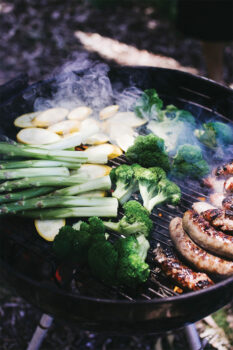
Royalty free photo by Pexels by Rachel Claire.
Jessica Small, Better Living for Texans Agent
The weather is getting warmer and more and more people are preparing for the grilling season. Grilling foods is popular for a variety of reasons—not the least of which are the delicious tastes we create when grilling and the joy of being surrounded by family and friends. However, from a nutritional standpoint, grilling is a great way to cook without a lot of added oils or fats.
Whether you use a gas, charcoal, or electric grill, it is important to follow the operating directions carefully and locate your grill in a safe place to avoid accidents. To help you get the most out of your grilling experience, we’d like to offer you a few tips:
1. Clean your grill. It’s important that you clean your grill before cooking. To clean your grill, remove the grates and wash in hot, soapy water. Scrub off any food particles or drippings with a brush or scrubbing pad. Rinse with clean water and air dry. Remember to remove and clean, or replace, the drip pan. Clean the outside of the grill with hot, soapy water and rinse clean. Follow the manufacturer’s instructions for cleaning the burners and interior of the grill.
2. Heat the grill for 10 to 15 minutes before adding food so that foods will be seared instead of steamed or baked.
3. Use tongs to turn solid pieces of meat. This is safer and will keep the juices of the meat inside.
Summer grilling is a tradition for many families. Grilled meals can be tasty, healthy, and economical. Grilling can be a low-fat cooking option that helps you add a variety of foods and colors to your plate, while also spending quality time outdoors with the family.
Grilling also provides an opportunity to teach young children a new way to cook as well as to share food safety tips, such as avoiding cross-contamination by using separate plates for raw and cooked meats.
Fruits also go well on the grill. When grilling fruits, it is important to keep an eye on the grill as fruits cook quickly. Grilled fruits can be delicious additions to a main dish or even desserts. It’s helpful to brush fruit lightly with oil or marinade to prevent sticking. When grilling, remember to keep your hands clean and to cook foods to a safe internal temperature throughout. Use a food thermometer (not your eyes) to make sure meats are fully cooked. Beef, pork, veal, and lamb (steaks, roasts, and chops) should be cooked to a minimum internal temperature of 145 degrees while ground beef, pork, and veal should be cooked to a minimum temperature of 160 degrees.
Be creative. Remember, your favorite vegetables and fruits taste great if grilled properly. In fact, you might find that even your pickiest eaters will enjoy their vegetables after the foods are grilled!
Texas A&M AgriLife Extension provides equal opportunities in its programs and employment to all persons, regardless of race, color, sex, religion, national origin, disability, age, genetic information, veteran status, sexual orientation, or gender identity. The Texas A&M University System, U.S. Department of Agriculture, and the County Commissioners Courts of Texas Cooperating.
